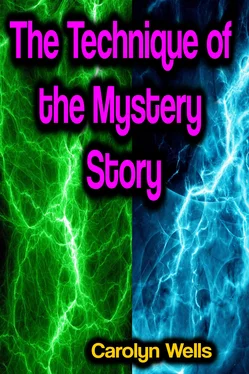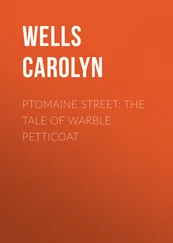Mr. Julian Hawthorne also discusses this question of interest as maintained by the inverse order of narration.
"… One charge, at least, does lie against the door of the riddle-story writer; and that is, that he is not sincere; he makes his mysteries backward, and knows the answer to his riddle before he states its terms. He deliberately supplies his reader, also, with all manner of false scents, well knowing them to be such; and concocts various seeming artless and innocent remarks and allusions, which in reality are diabolically artful, and would deceive the very elect. All this, I say, must be conceded; but it is not unfair; the very object, ostensibly, of the riddle story is to prompt you to sharpen your wits; and as you are yourself the real detective in the case, so you must regard your author as the real criminal whom you are to detect."
It is safe to say that Poe's conception of the interest-element in the Detective Story, as illustrated by his three great tales, "The Murders in the Rue Morgue," "The Purloined Letter," and "The Mystery of Marie Rôget," was that the great point was not the fascination of the mystery itself but the interest the reader would take in following the successive steps of reasoning by which the crime was ferreted out. The reader is thus turned into an analytical observer who not only delights in the mental ingenuity exhibited by the detective, but actually joins with him in working out the intricacies of a problem which, though at first seemingly insoluble, is at length mastered entirely. Thus his admiration for the "investigator" is happily coupled with his own delight in unraveling the skein which the author has woven expressly for the purpose, as Poe himself expresses it when he admits all the merits of the device, but modestly disclaims that his ingenious stories have real greatness. He speaks thus about them:
"They owe most of their popularity to being something in a new key. I do not mean to say that they are not ingenious—but people think them more ingenious than they are—on account of their method and air of method. In the 'Murders in the Rue Morgue,' for instance, where is the ingenuity of unraveling a web which you yourself (the author) have woven for the express purpose of unraveling? The reader is made to confound the ingenuity of the supposititious Dupin with that of the writer of the story."
Of course the ingenuity of the author and that of his character are identical, as they are in the case of Conan Doyle and Sherlock Holmes.
Doctor Doyle admits frankly his indebtedness to Poe, and though he claims another prototype than Dupin for his detective, yet he makes this acknowledgment:
"Edgar Allan Poe, who, in his carelessly prodigal fashion, threw out the seeds from which so many of our present forms of literature have sprung, was the father of the detective tale, and covered its limits so completely that I fail to see how his followers can find any fresh ground which they can confidently call their own. For the secret of the thinness and also of the intensity of the detective story is that the writer is left with only one quality, that of intellectual acuteness, with which to endow his hearer. Everything else is outside the picture and weakens the effect. The problem and its solution must form the theme, and the character drawing is limited and subordinate. On this narrow path the writer must walk, and he sees the footmarks of Poe always in front of him. He is happy if he ever finds the means of breaking away and striking out on some little side-track of his own."
To sum up, then, we must agree that for devotees the Detective Story sets a stirring mental exercise, with just enough of the complex background of life to distinguish it from a problem in mathematics. Whatever thrills of horror are excited come by way of the intellect, never starting directly in the emotions. The reader divests himself of sympathy, and applies to every situation the dry light of reason. It is only when one's reason is baffled, leaving the murder unexplained or the ghost at large, that one feels privileged to shudder. And such a shudder is remarkably different from a start that is unthinking. The Detective Story applies reason to some of the big half-mysteries of human conduct; and the result for the ordinary reader is not dissimilar to that felt by the philosopher when trying to square with his poor apparatus the secrets of Nature and Providence.
Chapter
7
The Real Detective and His Work
Fictive Detective Material
The Transcendent Detective
Pioneer Detectives of Fiction
Recent Detectives of Fiction
The Scientific Detective of Fiction
The New Psychology in Detective Stories
Other Types
The all-important character of the Detective Story is, of course, the Detective. He is not only the Star Performer, but the reason for the Detective Story itself. What Mr. Hawthorne calls the Transcendent Detective is the detective of fiction. Such a one is made, not born.
As Mr. Vance Thompson puts it:
"Readers who pant breathlessly after Sherlock Holmes and his like should give thanks to Edgar Allan Poe; when he invented Dupin in the 'Murders in the Rue Morgue,' he created once for all the type of the detective in fiction. In all the years it has not changed very much. Sherlock Holmes still sits in his dark, superheated chamber; he is drugged with tobacco and opium; he maintains the 'profound silence' that distinguished Poe's cold analyst; indeed, one may be sure that the type will live for another eighty years."
1. The Real Detective and His Work
But we have already agreed that this fiction detective has little or nothing to do with the real detective. When M. Goron, one of the greatest of French detectives, was asked concerning this, he replied:
"I dare say I have read nearly all the detective stories, those of Poe and Gaboriau, and 'Sir Doyle's' clever tales. Like every one else I love to follow the twists and turns that lead to the end of these apparently inexplicable problems. It is a good intellectual sport—like playing chess. But do not imagine for a moment," and M. Goron was emphatic, "that it has anything at all to do with practical police work. Nothing at all. It is not by such subtle, opium-bred guesswork and fine-drawn deduction that criminals are detected."
M. Goron's theory is that in thief-taking, as in everything else, system is of prime importance; and after that the most effective auxiliary of the detective is Chance. Almost always it is by a lucky hazard that the shrewd criminal is brought down. For instance, the taking of Magne; it was tragically absurd—for the farce ended in the basket of wet sawdust under the guillotine.
In fact, detectives of real life invariably scorn the transcendent detective of fiction, and, in his turn, the story-book detective scoffs at the methods of the Central Office men.
Mr. Arthur C. Train, in "Courts Criminal and The Camorra," thus mildly satirizes our detective of fiction and sets him quite apart from the genuine article:
"The sanctified tradition that a detective was an agile person with a variety of side whiskers no longer obtains even in light literature, and the most imaginative of us is frankly aware of the fact that a detective is just a common man earning (or pretending to earn) a common living by common and obvious means. Yet in spite of ourselves we are accustomed to attribute superhuman acuteness and a lightning-like rapidity of intellect to this vague and romantic class of fellow-citizens. The ordinary work of a detective, however, requires neither of these qualities. Honesty and obedience are his chief requirements, and if he have intelligence as well, so much the better, provided it be of the variety known as horse sense. A genuine candidate for the job of Sherlock Holmes would find little competition. In the first place, the usual work of a detective does not demand any extraordinary powers of deduction at all.
Читать дальше












